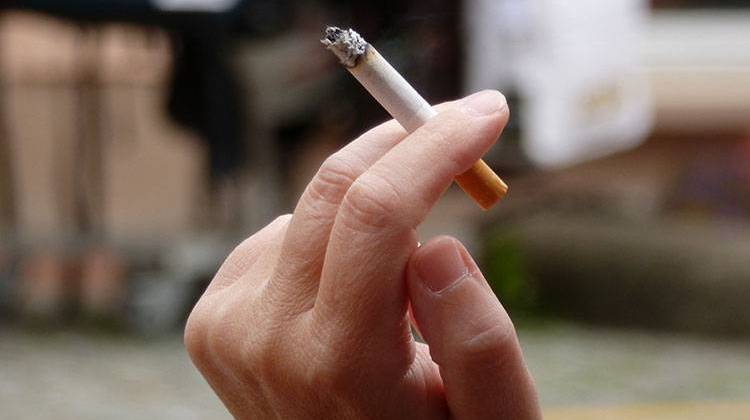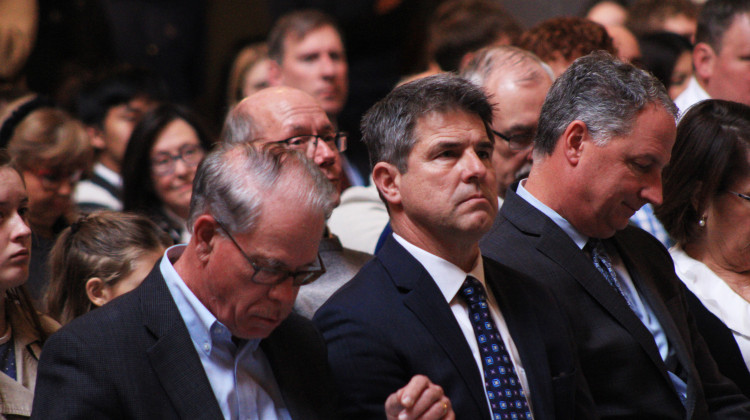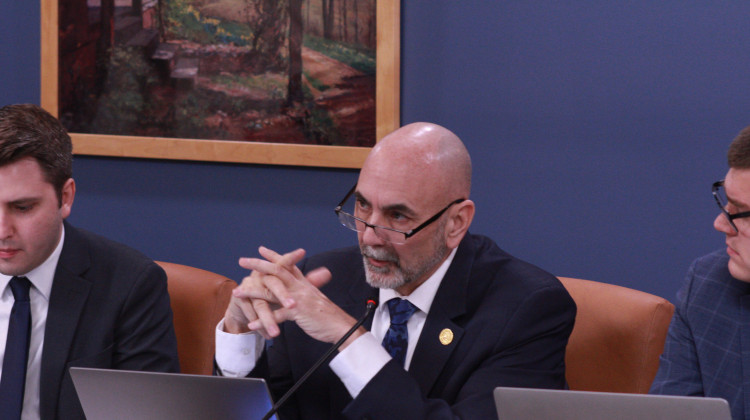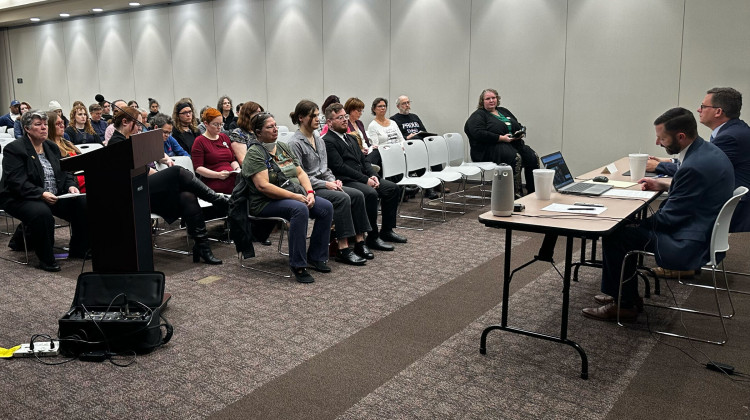Updated 3:50 p.m.
The state is set to lose $63 million in tobacco settlement payments next year after an arbitration panel determined it had not worked hard enough to collect funds from cigarette companies that aren’t part of the deal.
The ruling – issued last month by a three-judge panel – will reduce Indiana’s payment from $131 million to $68 million in 2014.
And there’s the potential for the state to lose even more. The recent ruling addresses claims from payments in 2003; the years 2004 through 2012 remain in dispute.
The state can appeal. Bryan Corbin, a spokesman for the Indiana attorney general, said “legal action is likely to be taken soon.”
Rep. Greg Porter, D-Indianapolis, said in a statement that his caucus learned about the ruling this week during a meeting with the attorney general’s office.
“Obviously, this will certainly harm our state’s ability to fund any number of programs designed to promote a healthy Indiana,” said Porter, the ranking Democrat on the budget-writing House Ways and Means Committee. “Unlike other states that used tobacco settlement dollars for things like highway funding, Indiana was diligent in using these dollars on health care issues.
“Now it is safe to say many of those initiatives are at risk,” he said.
Senate Appropriations Chairman Luke Kenley said there’s no immediate budget crisis. The state – which has a $2 billion surplus in it’s main checking account – will have the money to continue funding health programs during the current budget cycle, which ends June 30, 2015, he said.
But Kenley, R-Noblesville, said that if tobacco settlement payments continue to be reduced, lawmakers will be forced to take that into consideration when negotiating the next budget. Currently, the money is earmarked for a diverse group of health care programs, including tobacco cessation, children’s health insurance and community mental health centers.
“We’ll have to throw all those things into the mix and determine what gets a higher priority,” Kenley said. “That’s too bad. With the community mental health centers, for example, we might not have addressed that issue if this money had not been available.”
Gov. Mike Pence’s spokeswoman referred questions to a document detailing how the tobacco settlement money is spent.
Forty-six states, including Indiana, signed what was called a master settlement agreement in 1998 with four of the largest cigarette manufacturers in the United States. The companies agreed to pay the states roughly $206 billion over 25 years to settle claims regarding smoking-related health care costs and youth smoking.
Since then, another 40 or so tobacco companies have joined the settlement, which requires the companies to make annual payments to states.
The payments vary by state, manufacturer and year but they are primarily based on the number of cigarettes sold.
The settlement allows companies to reduce the amount they pay to states if they’ve lost market share to cigarette manufacturers that aren’t part of the master agreement. States were to be exempt from the cuts if they enacted – and enforced – laws that imposed obligations on any non-participating companies that sold cigarettes within their borders.
But the arbitration panel ruled in September that Indiana and five other states had failed to undertake “diligent enforcement” to collect those payments and therefore the participating tobacco companies could reduce what they paid to the states.
Corbin said the attorney general’s office disagrees with the decision and contends the state did enforce the rules. He said the arbitration panel unfairly considered that the state did not use tobacco settlement funds for its enforcement, even though the state used funds from other sources.
Also, according to the attorney general’s office, the term “diligent enforcement” was not defined in the original tobacco settlement.
“The arbitration panel in its recent ruling created a new enforcement definition and applied this new standard retroactively to states for actions taken more than a decade ago,” according to a fact sheet the attorney general’s office distributed about the ruling. “Indiana disagreed strongly with the arbitration panel’s implementing a new definition of enforcement that did not exist at the time.”
But Rep. Charlie Brown, the ranking Democrat on the House Public Health Committee, said the panel’s ruling means possible cuts to programs that can’t afford them.
“What is disturbing about this decision is that it appears to be tied to our state’s complete failure to pursue compliance from those cigarette manufacturers that chose not to be a part of the original settlement,” said Brown, who was the author of the original bill that defined the uses of tobacco settlement money.
“Indiana was asked to make an effort to get companies that did not sign the agreement to make payments into an escrow fund if they chose to do business here,” Brown said. “Obviously, they didn’t try hard enough.”
Denise Keane, executive vice president and general counsel of Altria Group, which owns Philip Morris USA, said last month that the decision “sends a strong message about the importance of diligently enforcing the laws that apply to non-participating manufacturers.”
Philip Morris and other companies that had signed onto the agreement sought the payment reductions from most of the states are part of the original tobacco deal. Twenty-two states agreed to settlements last year.
But Indiana and 14 other states opted to take the issue to arbitration instead.
“Indiana concluded the non-monetary terms of the settlement were unfavorable and not in the state’s interest, with potential long-term downsides even worse than losing arbitration,” the attorney general’s fact sheet said. “Indiana declined to settle for a smaller amount merely to end the process, preferring instead to argue its case in arbitration.”
The arbitration panel ruled in favor of nine states, saying they had done what was necessary to meet the terms of the original tobacco settlement. But Indiana and five other states lost.
“The non-diligent states could have avoided (the) result altogether had they either diligently enforced their escrow statutes or joined December’s settlement of these issues,” Keane said last month.
States that agreed to terms with the tobacco companies last fall received more than $1 billion in net additional cash payments from the release of their portion of disputed master settlement funds that had been set aside in a separate account. In addition, those states will be protected from any further downward adjustments in their master settlement payments for the years 2003 through 2012, according to Altria.
But Keane said the cigarette companies are “fully prepared to move forward with the arbitration for the 2004 dispute, and for all of the remaining years as well” for Indiana and other states that lost in arbitration.
“That being said, we remain open to resolving these disputes in a way that makes sense for us and the states that did not join the settlement,” she said.
Kenley said he’s urged Indiana Attorney General Greg Zoeller to appeal the arbitration decision.
“I think there are several things wrong with the way this decision was brought about,” Kenley said.
And he said if the arbitration panel’s ruling stands, it could make it more likely Indiana will lose additional money.
“This is going to go on and on. This is not a one time settlement deal,” Kenley said. “My guess is that whatever precedents are set will become some type of standard for an annual decision. And since Indiana came out on the short end, it bodes particularly bad for us.”
Lesley Weidenbener is managing editor of TheStatehouseFile.com, a news website powered by Franklin College journalism students.
 DONATE
DONATE








 Support WFYI. We can't do it without you.
Support WFYI. We can't do it without you.